50 Secret Messages Your Body Is Trying to Tell You
These surprising symptoms are your body's way of telling you something is wrong.

When you stop and think about it, it's incredible what our bodies can accomplish on their own. Metabolism, temperature control, healing, and organ function are all automated, with no need for any back-and-forth conversation. But that doesn't mean that your body isn't trying to communicate with you all the time. Like a car's vehicle warning lights, your body comes equipped with plenty of useful indicators—you just might not know what they mean. With that in mind, we've compiled 50 surprising symptoms that are your body's way of telling you something is wrong.
1
You have a metallic taste in your mouth = You could have chronic kidney disease

When your kidneys haven't been functioning properly for a long time, a substance called urea builds up in the bloodstream, causing a condition called uremia. One of the primary symptoms of uremia is experiencing a metallic taste. If that's your only symptom, it's almost certainly caused by something else, but combined with changes in urination and back pain, it could be kidney disease.
2
You have diagonal earlobe creases = You could have heart disease
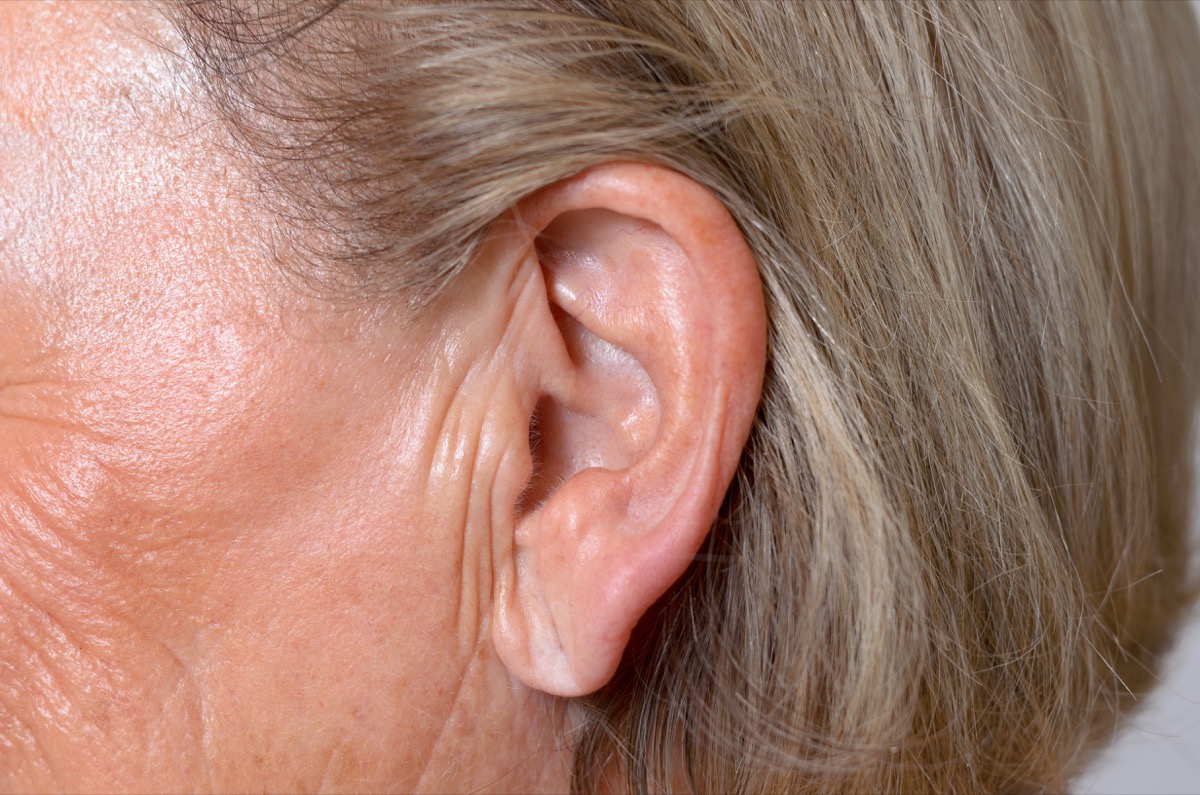
Take a look at your earlobe. If it has a wrinkle-like line going down it, you might want to put some extra effort into boosting your heart health. "There are many studies that support an association between [earlobe crease] and [coronary artery disease]," according to a 2015 report in the Archives of Medical Science.
A number of studies have found that such creases were a sign of an increased risk of coronary heart disease. A 2016 study published in the British Medical Journal found that those with creases on both ears were at a greater risk than those with a crease on just one ear.
3
You have lots of skin tags = You're at risk for diabetes
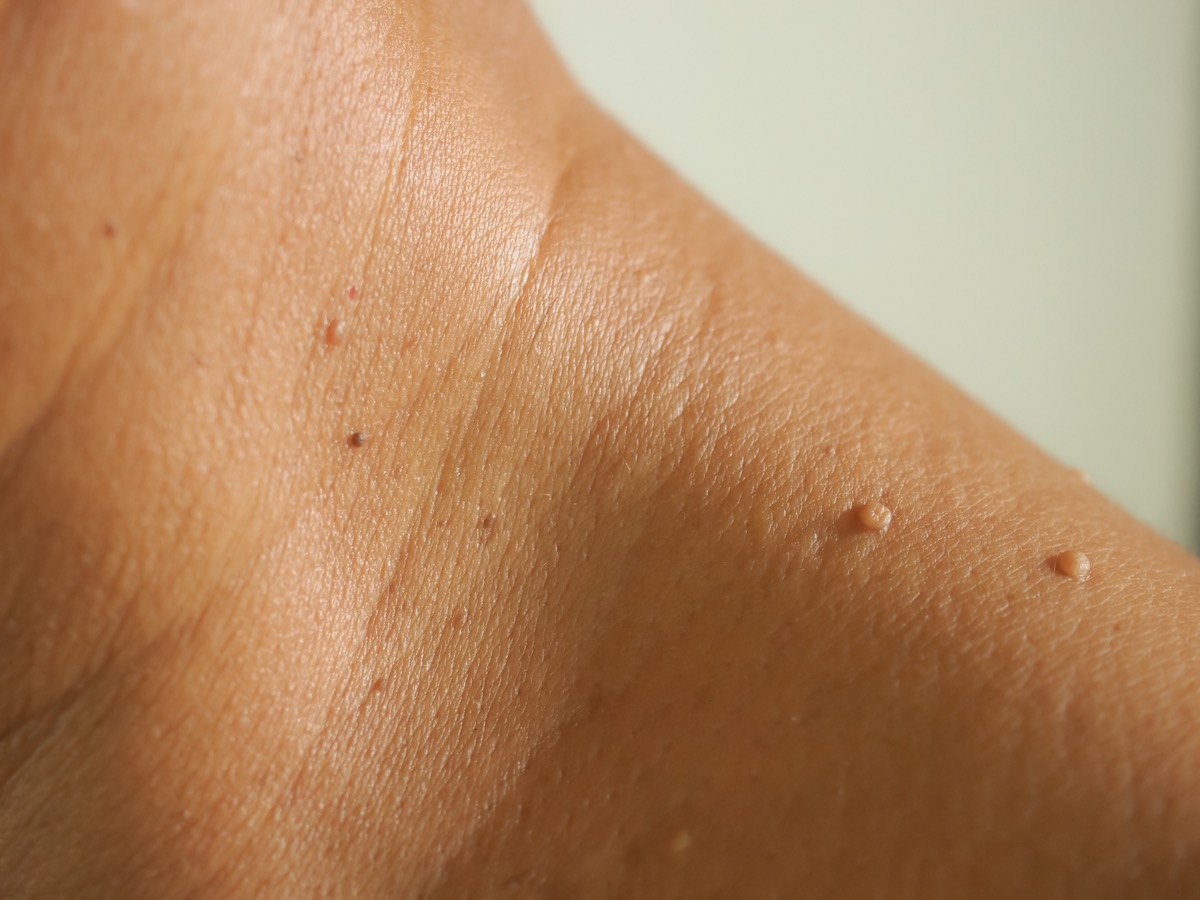
Skin tags are small, benign outgrowths on the surface of the skin. Diabetes is a condition that causes chronic high blood sugar levels. What's the connection? Scientists still aren't sure, but multiple studies—including this notable 2007 study published in the International Journal of Dermatology—have found that people with multiple skin tags are at a higher risk of contracting type 2 diabetes.
4
You have an aching jaw = You could have Lyme disease

Lyme disease is one of the more difficult diseases to diagnose. But if you fear that you might have it, take note of your jaw. If you're suffering from chronic pain that comes and goes, the cause could, in fact, be this tick-borne disease.
Though a medical professional may see this jaw pain as TMJ—or "temporal mandibular joint disorder"—your body may be trying to tell you it's something more serious, so be sure to ask about Lyme specifically. As Laura Landro wrote in The Wall Street Journal, symptoms of Lyme disease include not only headaches and muscle aches, but also complications that affect the joints, including the jaw.
5
You have a desire to chew ice = You need more iron

If you love nothing more than chugging an iced beverage so you can get to the ice cubes left at the bottom, it might be time to reach for a bottle of multivitamins.
A 2014 study published in the journal Medical Hypothesis found that these two things are connected. Your body needs iron to help carry oxygen to your brain and your muscles, and people who are lacking in iron have less oxygen in their blood. Researchers believe that the act of chomping down on ice triggers a response in which your body sends more blood to the brain, which may produce feelings of greater alertness.
If this sounds like you and you're iron deficient, the best sources for getting more iron are meat, poultry, and fish.
6
There's a gray ring around your cornea = You need to watch your cholesterol
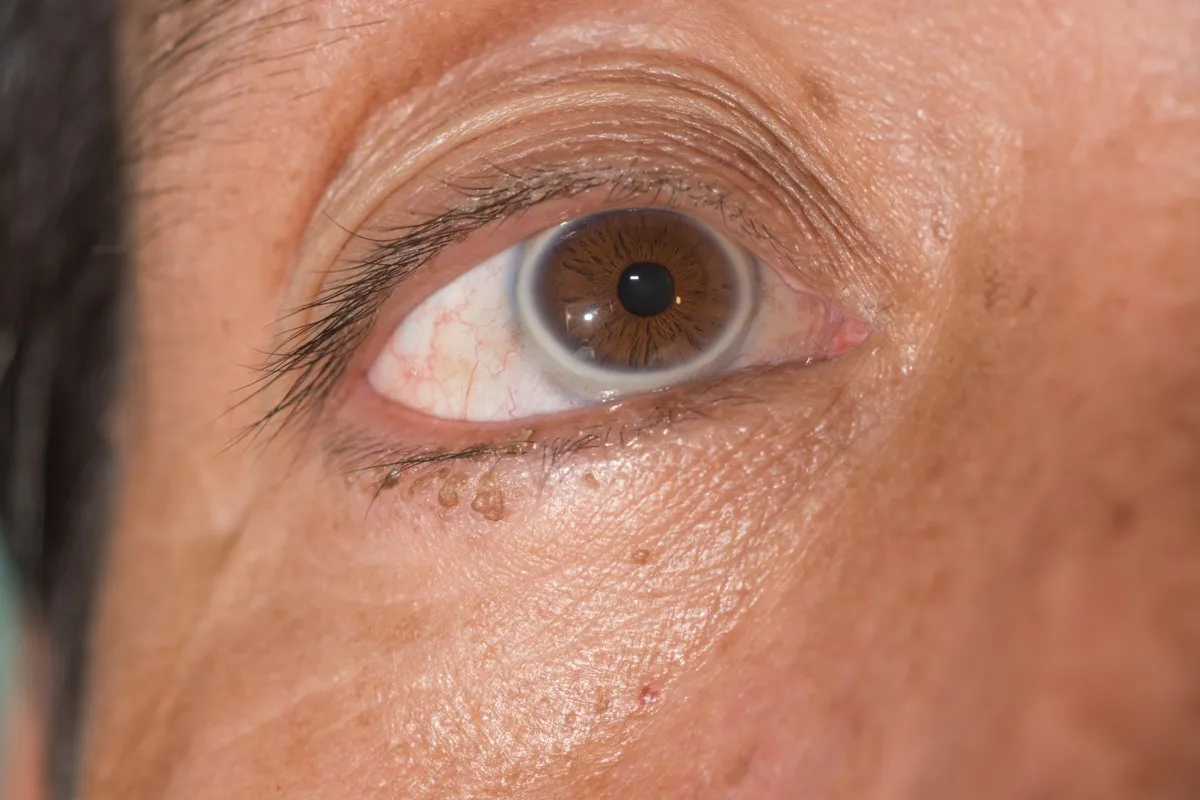
A gray or white arc above your cornea is known as arcus senilis. And if you have one, it may be a sign that you need to cut back on fatty foods.
Arcus senilis is most common in adults, and a result of fatty deposits around the edge of the cornea. In more severe cases, especially when it occurs in younger people, it can be the result of high cholesterol or high triglyceride levels.
7
Your fingernails have white lines = You could have kidney disease
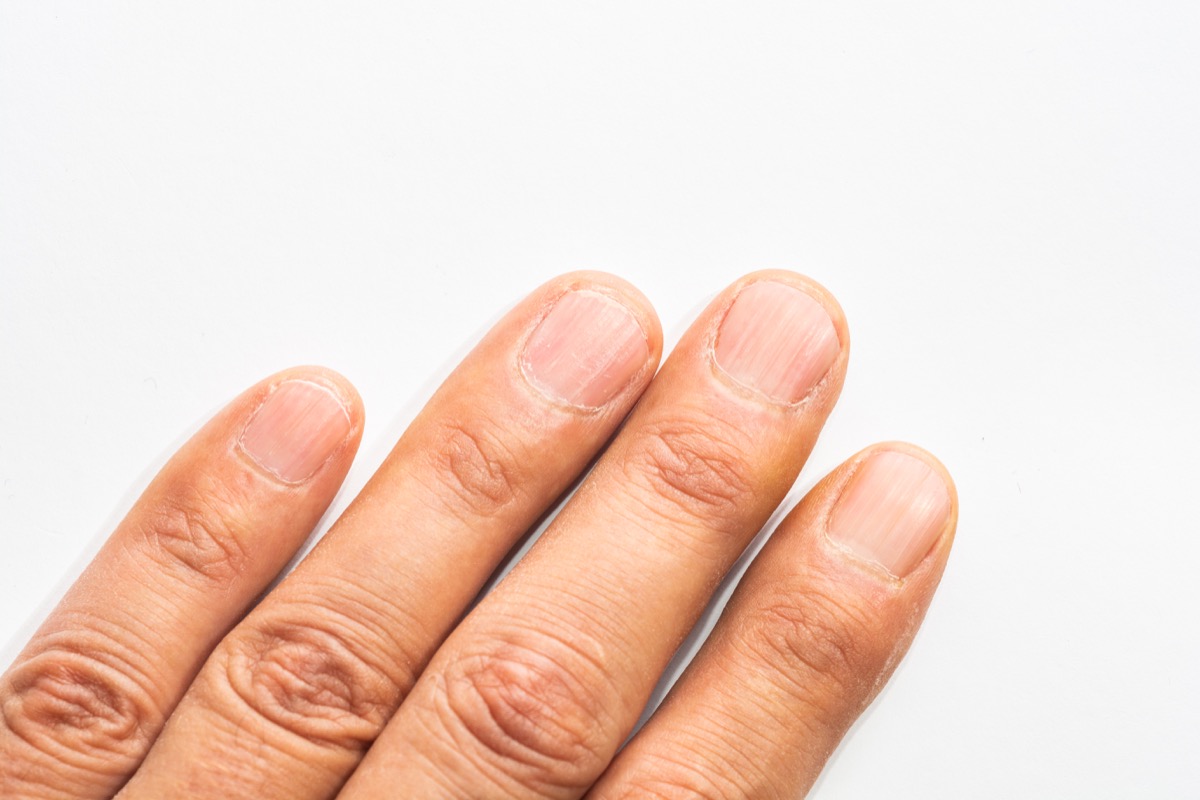
If your nails suddenly turn white, or white lines appear on them, it could be a sign of something serious, like kidney or liver disease. As dermatologist Christine Poblete-Lopez, MD, told the Cleveland Clinic, "Distinct white streaks and spots on nails can point to chronic kidney disease." She also notes that ridged nails, creating a spoon shape, can be a sign of kidney issues.
But if you've always had white spots on your nails, you have little to worry about—that's a normal occurrence.
8
You have yellow lumps on your eyelids = You're at higher risk for heart disease
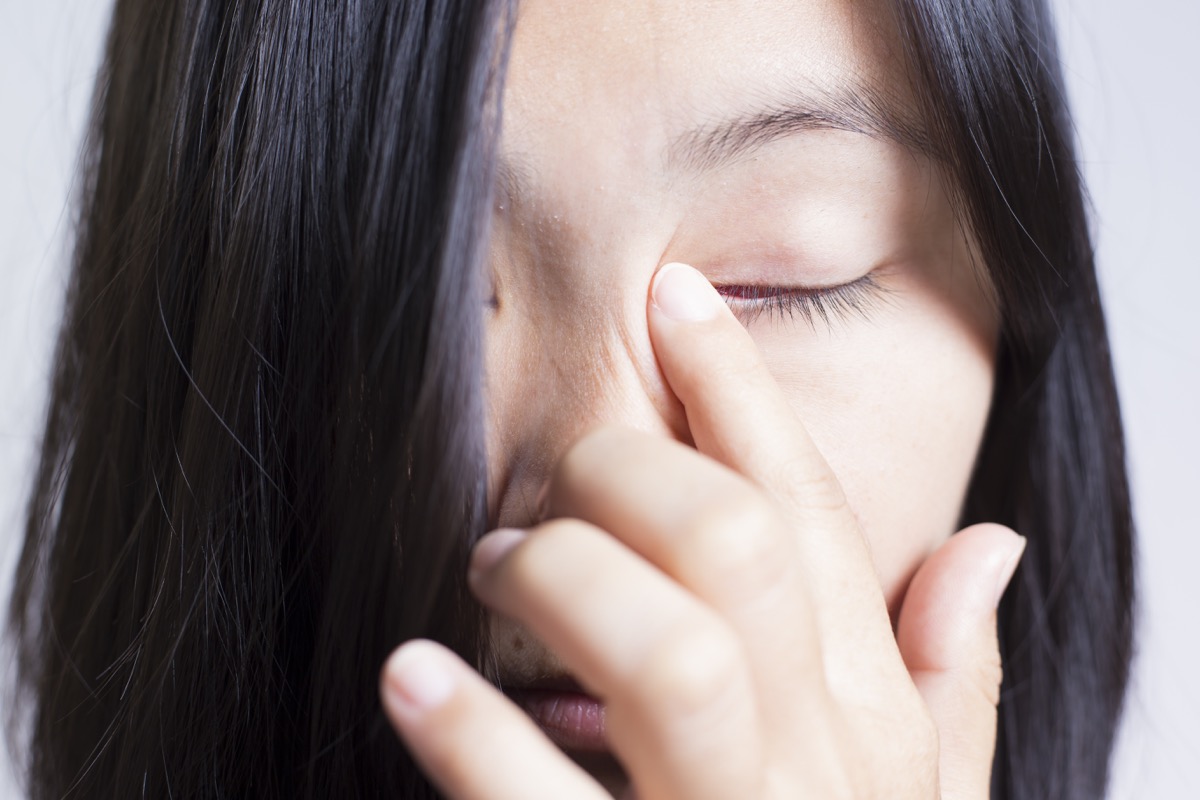
Yellow bumps on the eyelids are called xanthelasma, and according to the Harvard Heart Letter, they're a legitimate reason to be worried about your cardiac health. These lumps are actually small deposits of cholesterol, similar to the ones that form in blood vessels and cause blockages. People with xanthelasma are 40 percent more likely to develop heart disease and 51 percent more likely to have a heart attack.
9
You always have heartburn = You could have Barrett's esophagus

Most people suffer from heartburn at some point during their lives, but if you have it constantly, you're at risk of developing Barrett's esophagus. If the lower portion of your esophagus is chronically subjected to stomach acid, the cells there will start to change, and they may even turn cancerous. Barrett's esophagus often leads to esophageal adenocarcinoma, so make sure your doctor knows about your heartburn.
10
You're craving salty foods = You could have Addison's disease

Some people love salty food. But if you find you're suddenly craving chips, fries, or other salty snacks—or reaching for the salt shaker at every meal—it may be a sign of something more serious. An adrenal deficiency, also known as Addison's disease, can lead to an intense craving for salt, as Todd B. Nippoldt, MD, told the Mayo Clinic. Especially if accompanied by other symptoms such as muscle fatigue and abdominal pain, a craving for salt might be worth asking a medical professional about.
11
You're having trouble hearing = You might have kidney problems

If you're having trouble hearing what others are saying, it might not just be your ears that need to get checked. According to a 2010 study published in the American Journal of Kidney Diseases, older adults with chronic kidney disease are more likely to have hearing loss than those without it.
"Hearing loss is commonly linked to syndromal kidney disease. However, this study suggests a strong tie to [chronic kidney disease] in general," said the study's author, David Harris, associate dean of Sydney Medical School-Westmead at the University of Sydney.
12
Your breath smells sweet = You could have diabetes

If your body doesn't produce enough insulin or it isn't working properly—which is what happens with diabetics—chemicals called ketones start to build up in your blood. Your body will try to get rid of them through your saliva, causing your breath to smell sweet or, in some cases, like nail polish remover. This is such a reliable sign that a 2014 study published in the Journal of Breath Research found that breath scent is a dependable, non-invasive way to tell if young children have type 1 diabetes.
13
You have a lump on your collarbone = You might have gastric cancer
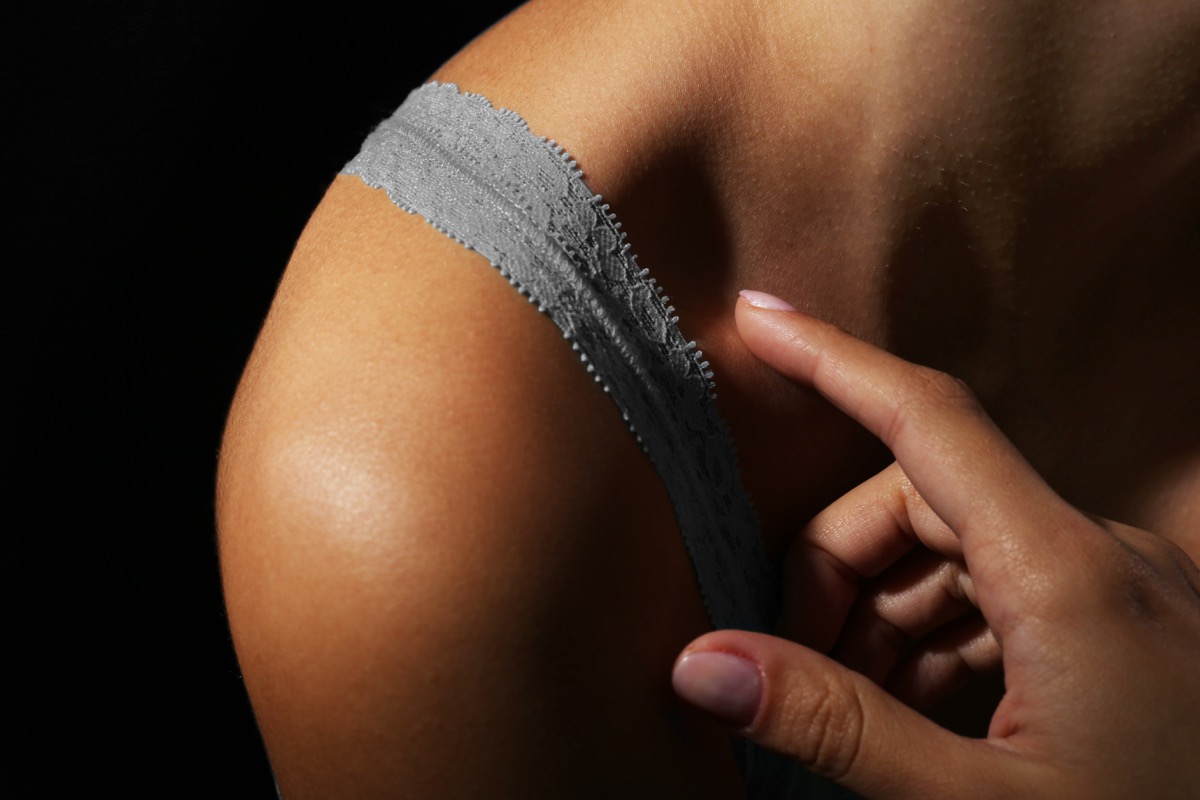
Located atop your collarbone near your neck is a lymph node called Virchow's node, and oddly enough, it can serve as a warning signal for your digestive system. When this node swells up—a condition called supraclavicular lymphadenopathy—it may be the first sign of cancer of the stomach, intestines, or colon.
14
Your hair is thinning = You need more iron

If you notice your hair is thinning out, that could be another symptom of iron deficiency. According to a 2013 study published in the Journal of Korean Medical Science, a lack of iron, which helps move blood and oxygen to your brain and muscles, might actually cause hair to fall out.
15
You laugh or cry uncontrollably for no reason = You could have MS

This symptom is called pseudobulbar affect (PBA), and it's much more distressing and embarrassing than simply laughing too hard at a bad joke. Miriam Franco, MSW, of the Multiple Sclerosis Association of America writes that PBA "occurs in 10 percent of people with MS, although some research suggests a much larger percentage."
16
Your eyes are always puffy = You may have kidney or heart disease
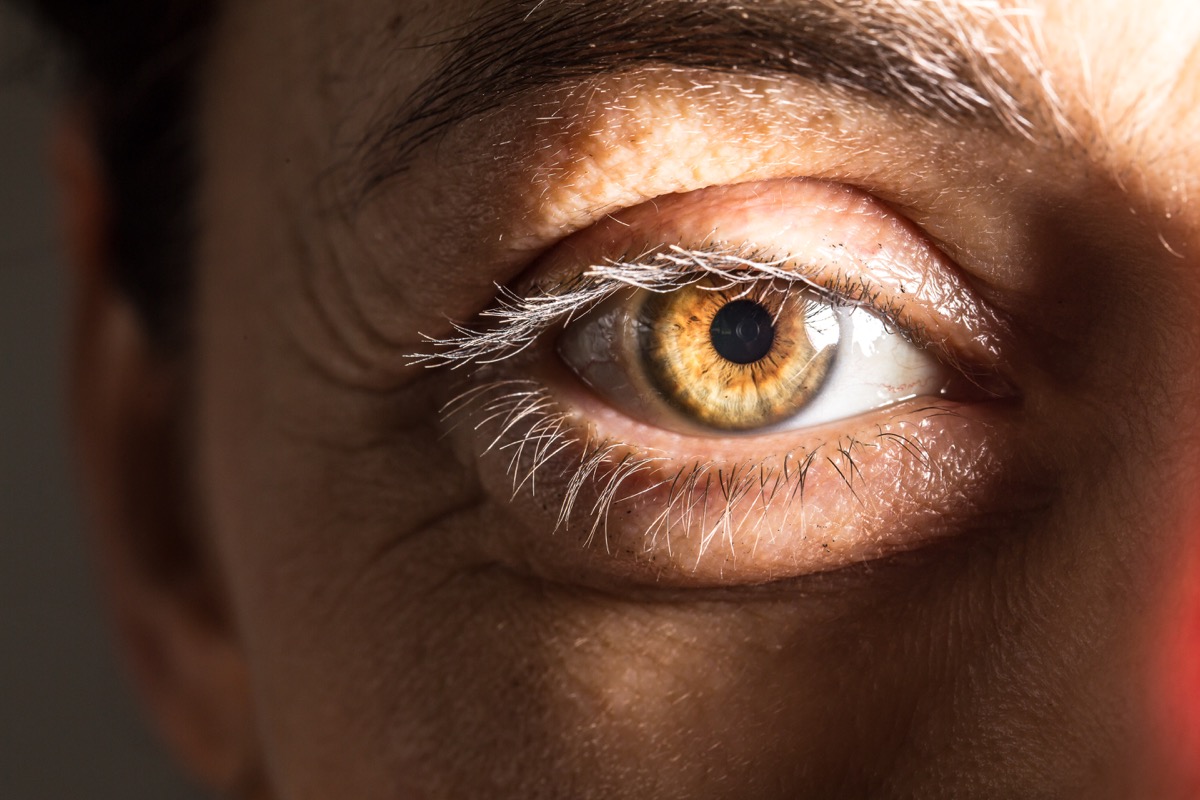
Both kidney and heart problems can prevent your body from getting rid of excess fluid properly, and it can start to build up in unusual places, particularly in the mornings. Although many other things can cause puffiness around the eyes—including lack of sleep—chronic puffy eyes could be a symptom of a serious problem, according to the National Kidney Foundation.
17
Your ears hurt after you eat a big meal = You could have acid reflux

Referred pain occurs when an injury or trauma to one part of the body causes another part to hurt. In this case, the esophagus and the ears are both located along the vagus nerve, so stomach acid that irritates the esophagus can cause pain elsewhere along that nerve, including in the ears. According to an article in American Family Physician, you can have gastroesophageal reflux disease (GERD) without ever feeling heartburn—and one possible symptom of GERD is ear pain.
18
You have a cough that won't quit = Your airway has shrunk

That constant hacking may be a lingering cold, but it could also be something more serious like post-bronchitis syndrome, according to Mitchell Gaynor, MD, assistant clinical professor of medicine at Weill Cornell Medical College. Similar to asthma, it means your airways have temporarily gotten smaller. "People think unless you're wheezing and short of breath it's not asthma, but that's not true," Gaynor explained to Men's Journal.
19
You're colder than everyone around you = You might have an underactive thyroid

If you're putting on extra layers when those around you are sweating, your body may be trying to tell you that there's something off with your thyroid. A common symptom of an underactive thyroid is feeling unusually cold—even when the temperature is objectively warm.
As Matthew Thorpe, MD, wrote for Healthline, heat is a byproduct of burning calories, so if your thyroid isn't burning as many calories, that means you're not generating as much heat.
"That's why low levels of thyroid hormone cause you to feel colder than others around you. About 40 percent of low-thyroid individuals feel more sensitive to cold than usual," he writes. "If you've noticed yourself feeling colder than normal lately, it could be a sign of hypothyroidism."
20
You have a brightly colored tongue = You need more B12

If your tongue looks bright red, that might mean you need more B12. As the folks at Livestrong put it, "This change in appearance comes from depapillation of the tongue: loss of the little bumps that normally give the tongue a light pink, velvety appearance … Without these little bumps, called papillae, the tongue looks red and beefy." Medical professionals even call this "beefsteak tongue."
According to Stanford Medicine, this means your body could use more iron, folate, and vitamin B12. You can stock up on B12 by eating more pork, plain low-fat yogurt, salmon, chicken, and eggs.
21
You've got a foggy brain = You need to cut back on gluten

If you're walking around in a slight haze after lunch, even after having a good night's sleep and exercising regularly, it may be your body's way of telling you to cut back on the bread and pasta—or, worse, that you have celiac disease.
As Gaynor told Men's Journal, "There's a huge gut-brain connection, and if gluten is causing inflammation in your gut, you're malabsorbing nutrients and you've disturbed your gut's microbiome."
22
You have a brown streak under your nail = You could have skin cancer
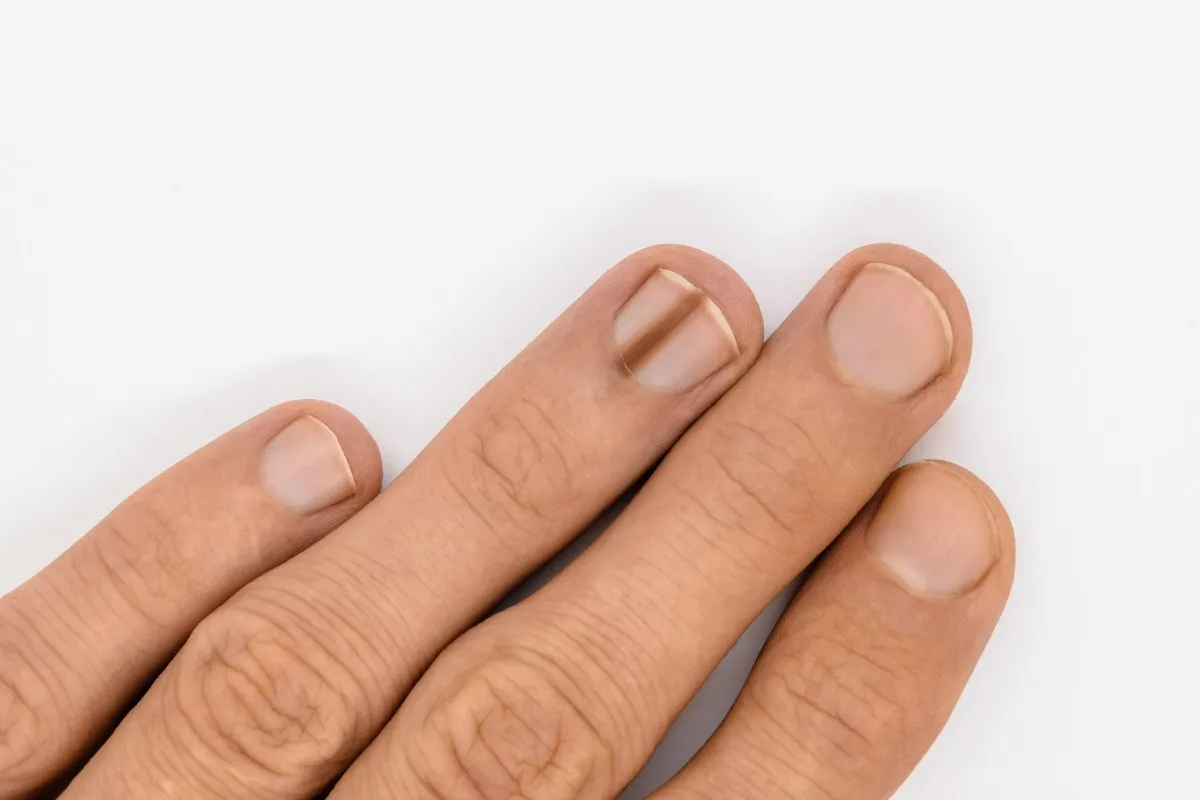
Again, there's no need to leap straight to a cancer diagnosis if you've got something brown in your nail bed. However, it's worth knowing that skin cancer can indeed (though rarely) develop under your fingernails, and it looks like a black or brown streak. This is most common in people of color, according to the Canadian Dermatology Association, and it's called subungual melanoma.
23
You're smelling things that aren't there = You should see a neurologist

Phantosmia is a condition in which your nose catches a whiff of something—rotten eggs, wet dogs, something else similarly unpleasant—that's not actually there.
These "phantom smells" may be your brain subtly letting you know something is off. According to the Mayo Clinic, it could be a sign of something as simple as inflamed sinuses or as concerning as a brain tumor, epilepsy, or Parkinson's disease. Either way, your body is giving you a heads up to call your doctor, stat.
24
You've got red and white spots on your tongue = Your taste buds have worn down
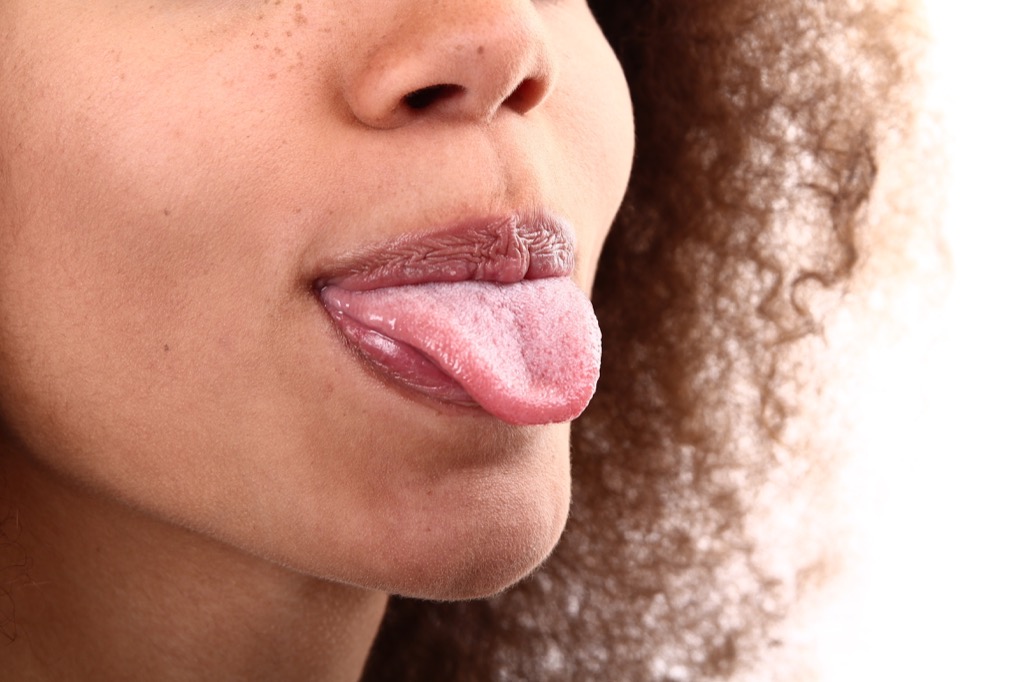
A tongue with red and white spots isn't anything to freak out about. It's just a sign that your taste buds have worn down, possibly because you have temporarily damaged them with too much sour candy (surprisingly common) or by eating hot food that lightly scorched them and caused desensitization. Give it some time—and stop damaging the buds—and they'll grow back to full health in no time.
25
Your fingers and toes are regularly blue = You should get your lungs and heart checked out

Your fingers and toes can turn blue in the cold due to reduced blood circulation. However, if this happens when you're not in a cold environment or at a high altitude, blue coloration (also called cyanosis) could mean that your blood doesn't have enough oxygen. According to a publication from the National Institute of Health (NIH), a number of lung and heart problems can cause cyanosis.
26
You have unexplained muscle cramps = You might not be getting enough potassium

Most people get enough potassium in their diets to prevent any symptoms, but if you lose a lot of fluids—for example, if you sweat excessively or have a flu that causes vomiting and diarrhea—you may enter a state of hypokalemia. If your potassium levels get low enough, your muscles can experience weakness, pain, or cramping unrelated to exercise. Usually, eating a banana or drinking a sports beverage is enough to restore balance.
27
You can't stop sweating = You could be having a heart attack

When you think about the signs of a heart attack, you probably imagine chest pain and shortness of breath, but not everyone displays these symptoms. One lesser-known sign is sudden, uncontrollable sweating. As Robert J. Bryg, MD, wrote for OnHealth, breaking out in a sweat when you aren't hot, exercising, or running a fever is a common symptom of a heart attack.
28
Your eyes turn yellow = You need to get your liver checked

If the whites of your eyes are no longer white but bright yellow, you could have jaundice. Usually, your skin will take on a yellowish tinge, too. Multiple conditions can cause jaundice, but they all mean that your liver isn't properly breaking down bilirubin, a pigment in bile that causes the yellow coloring. You'll want to get your liver examined by a doctor, particularly if you have a fever as well.
29
You urinate frequently = You could have diabetes
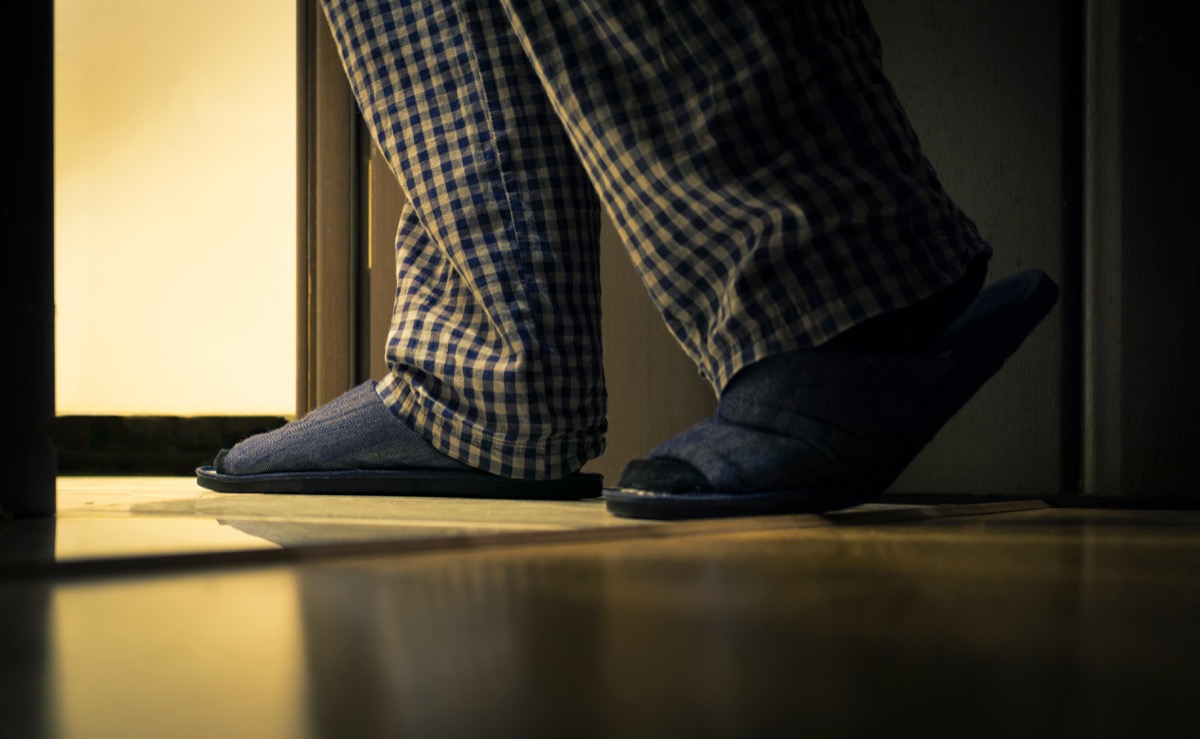
Have you recently noticed that it's hard to get through a movie without a bathroom break or two, or that you're frequently hopping up in the middle of the night to make a bathroom run? While you might chalk this up to having a small bladder, you should consider whether something else may be at play.
"Often, one of the first symptoms of diabetes is frequent urination, which is called polyuria," says Mike Bohl, MD, senior medical writer at Health Guide. "In fact, the word 'diabetes' comes from the Greek word for 'siphon.' When a person has diabetes, they have high levels of sugar in their blood. As the kidneys filter the blood, sugar also gets into the urine."
Because of osmosis, Bohl explains, this sugar pulls water with it. "This effectively creates a large volume of urine," he says. "This means people with uncontrolled diabetes pee frequently, and they also usually drink a lot to make up for it."
30
You wake up with headaches = You could have sleep apnea

Snoring and daytime sleepiness are common signs of sleep apnea, a condition where you pause or stop breathing during sleep. These pauses in breathing can cause your blood oxygen levels to drop, Robert Oexman, MD, told Bustle—meaning you may wake up with a headache. Additionally, the effort needed to start breathing again can strain neck muscles, also leading to headaches.
31
You start to lose hair from your eyebrows = You could have an underactive thyroid
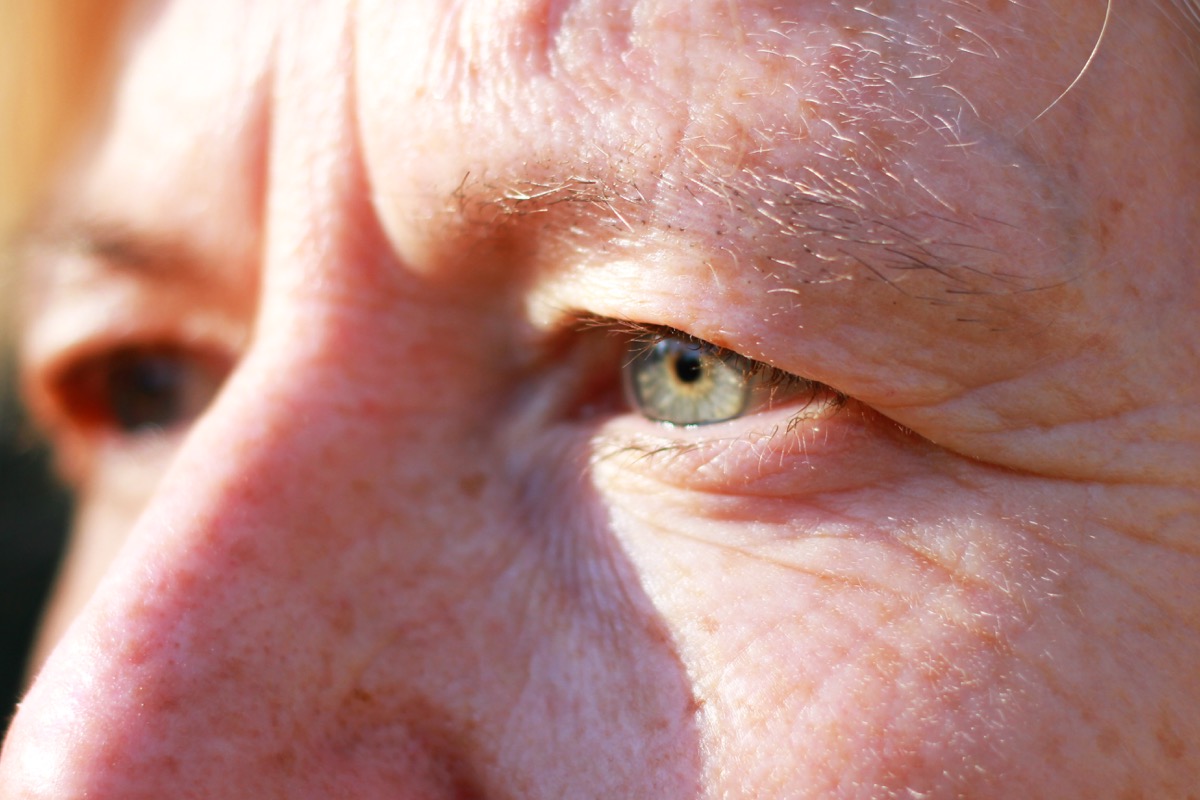
Our eyebrows do tend to thin out as we age, but hypothyroidism—a thyroid gland that's not putting out enough hormones—can cause eyebrow hair to fall out. Usually, it's the outer third of the eyebrows that are affected. The good news is that, with treatment, the hair will grow back within a few months.
32
You have nail fungus = You could have liver disease
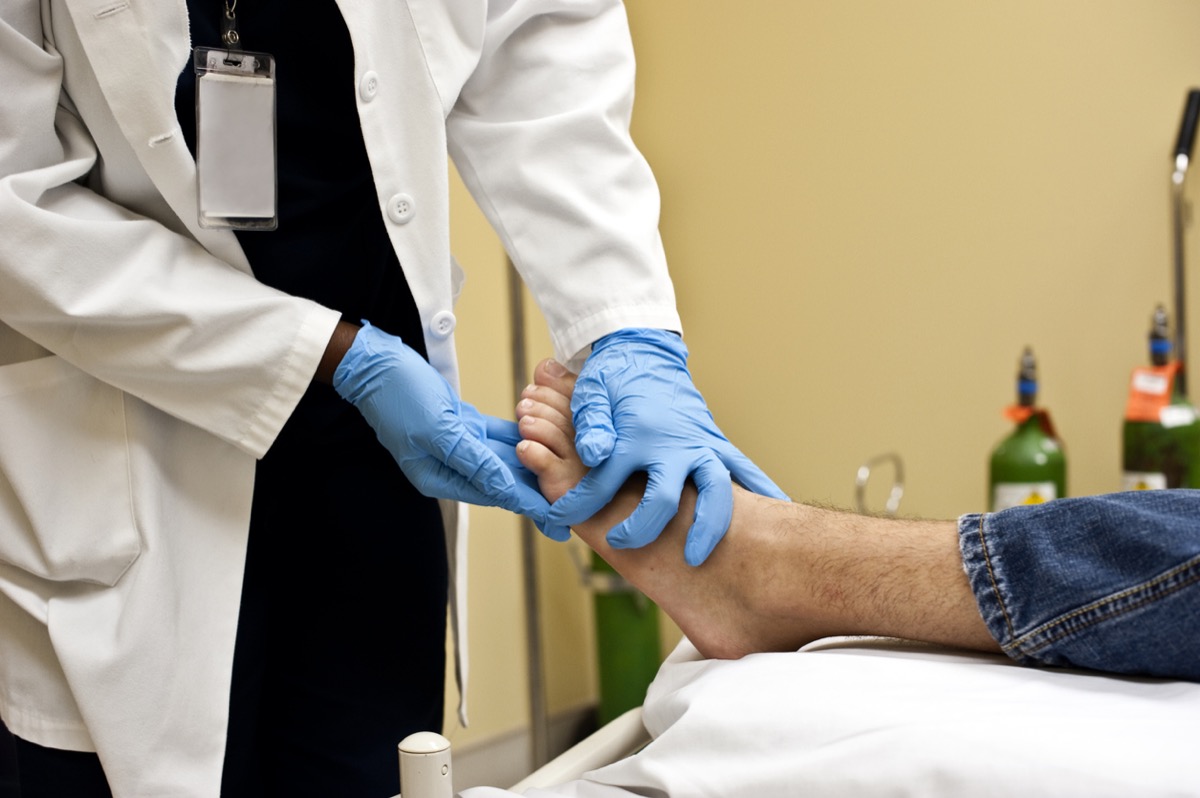
According to a 2010 study published in the Journal of the European Academy of Dermatology and Venereology of patients with hepatitis B, hepatitis C, and cirrhosis of the liver, those with liver disease were significantly more likely than the general public to see changes to their fingernails or toenails. Onychomycosis, or a fungal infection of the nails, was the most common. Most anti-fungal medications are hard on the liver, so patients with liver disease need to seek alternate treatments.
33
Your hands are pale = You could be anemic
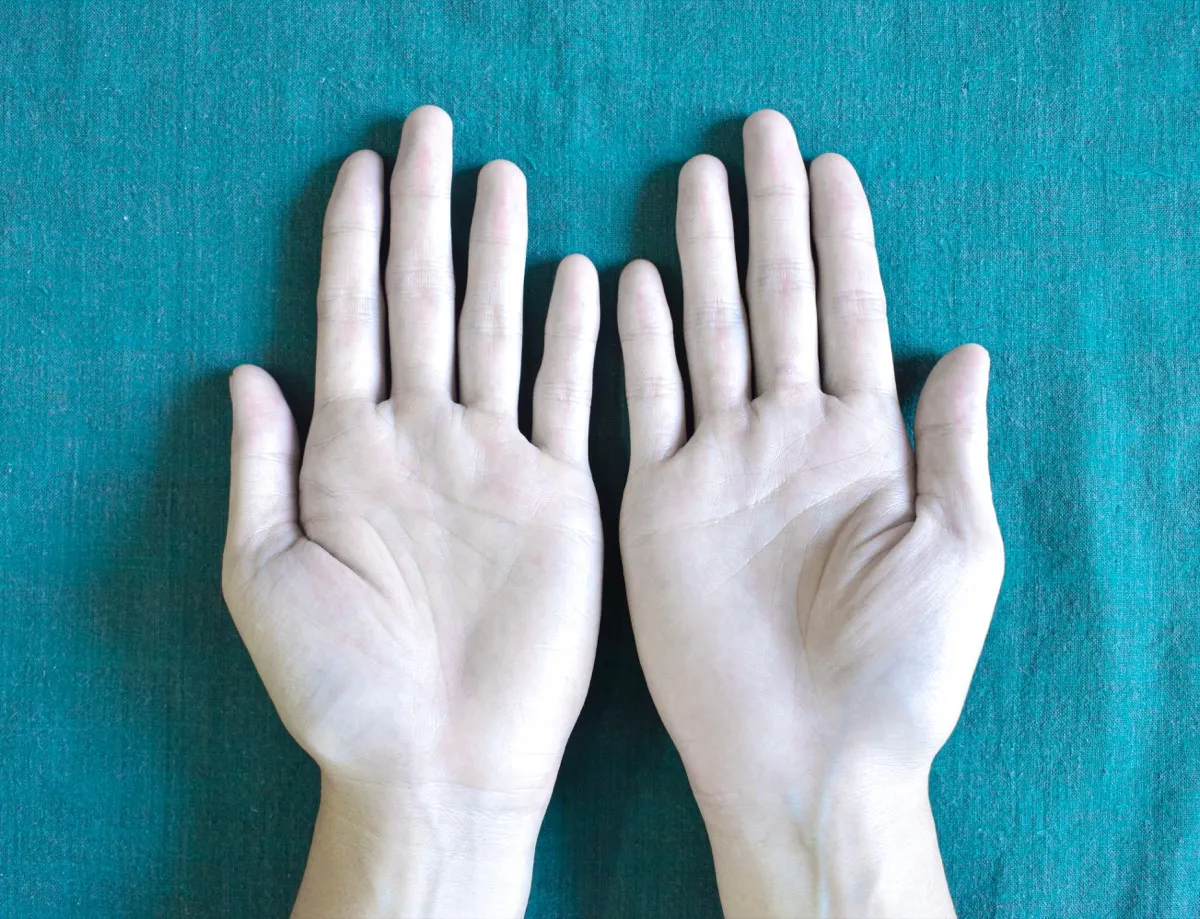
Anemia is a condition that occurs when a person doesn't produce enough red blood cells or the existing red blood cells don't work well, which means that the blood fails to deliver enough oxygen throughout the body. Another result of reduced red blood cells is a lack of color in the skin, particularly in the extremities. If your hands look pale and yellowish, it may be time to check your iron levels.
34
Your feet are restless at night = You need more iron

Along with causing pale hands, iron deficiency anemia can cause Willis-Ekbom disease, known more commonly as restless leg syndrome (RLS). The link between low iron levels and tingling or crawling sensations in the legs is still unknown, according to the Harvard Health Letter, but oral iron supplements do seem to relieve the problem substantially.
35
Your middle finger is bent = You could have rheumatoid arthritis

Rheumatoid arthritis causes swelling in the joints, particularly in the fingers and hands. Pain and stiffness are the most common symptoms, but the swelling can also cause a number of hand deformities. As orthopedic surgeon Anuj Netto, MD, wrote for Arthritis Health, these include trigger finger and Boutonniere deformity, in which the middle knuckle becomes stuck in a bent position.
36
Your cuticles are red = You could have lupus

Anyone who watched the show House knows that the autoimmune disease lupus can cause a wide variety of seemingly unconnected symptoms. That's because lupus affects nearly every part of the body—including the cuticles of your fingernails. The skin around a lupus patient's fingernail can become red and inflamed, though this is usually accompanied by other skin symptoms and joint pain.
37
You have a lump under your arm = You could have breast cancer
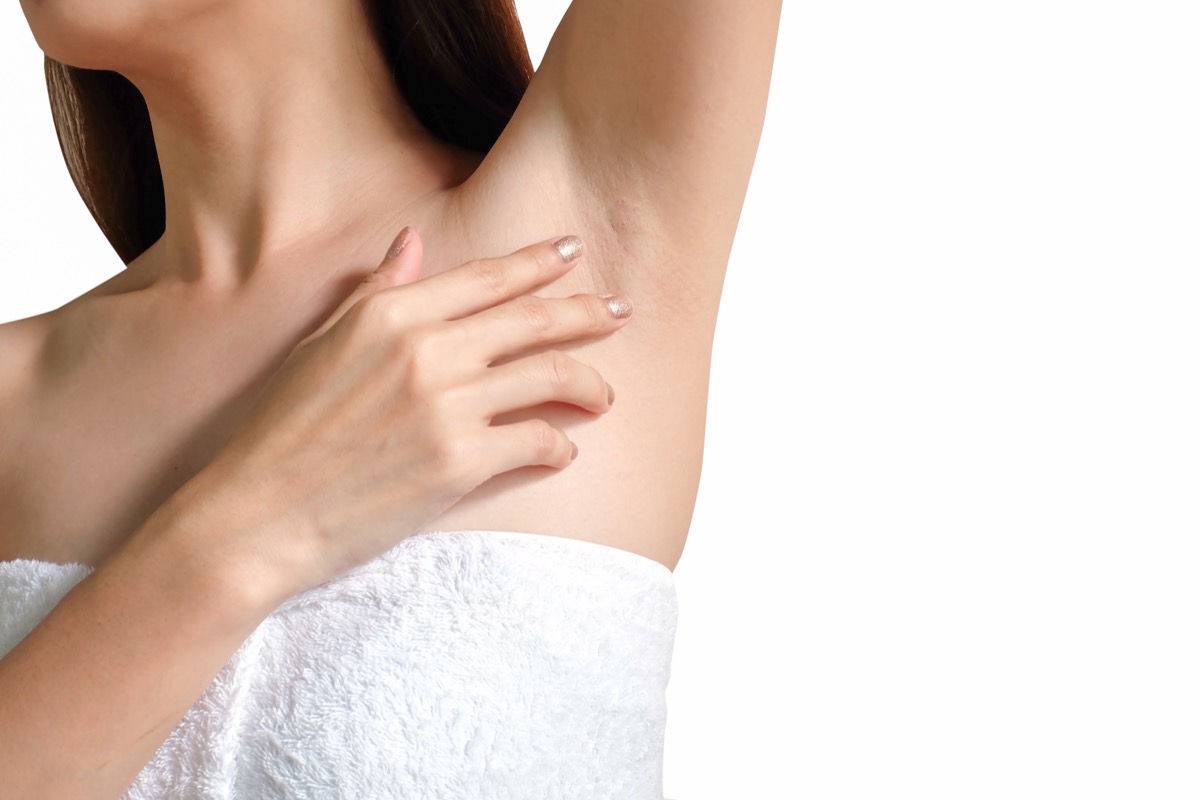
Many people know the importance of self-exams for early detection of breast cancer, but it's important to know that a lump under the armpit can be a sign of this disease as well. There are lymph nodes located in your armpits, and they can swell for a number of reasons, including breast cancer that has spread to these nodes. You may feel a lump in your armpit before you find one in your breast.
38
Your fingernails have white spots = You need more zinc
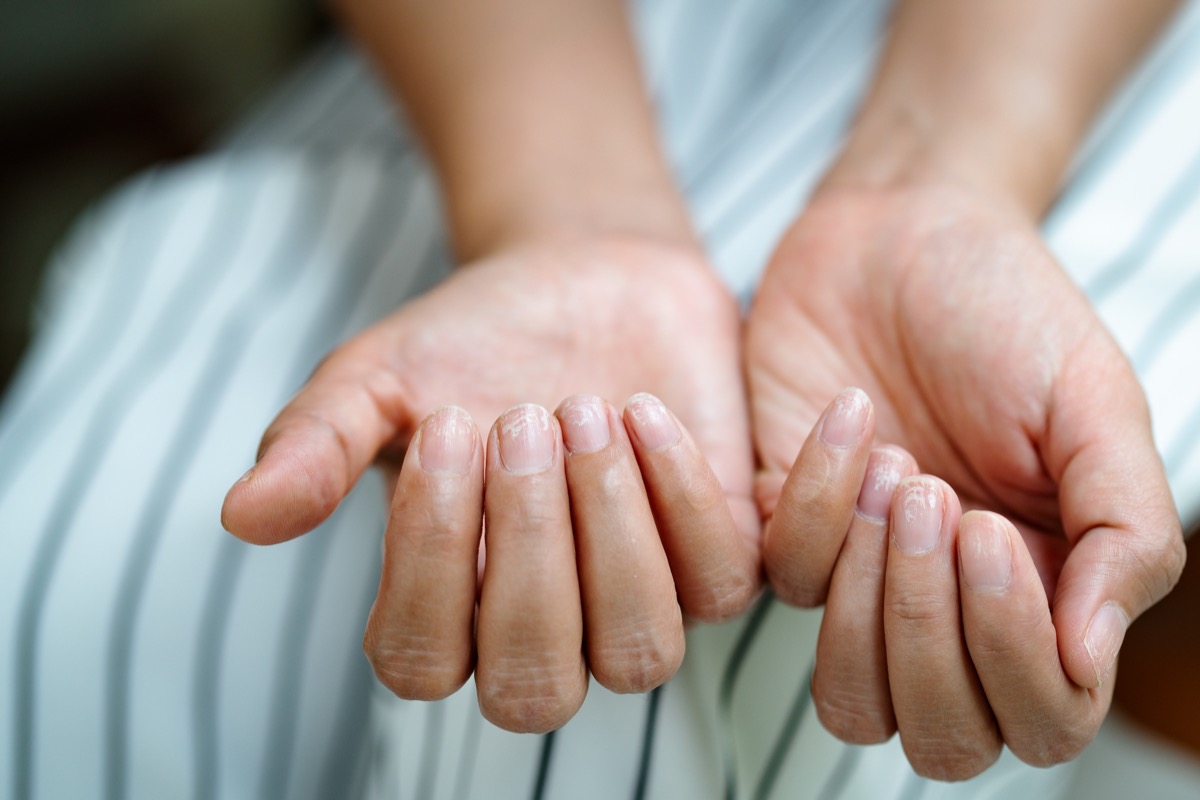
Leukonychia, or white spots on the fingernails, is usually caused by some sort of damage to the nail bed. Less commonly, though, it can be caused by a deficiency of zinc in your diet. This mineral helps your body heal and produce new cells. Most Americans get plenty of zinc, but since it's most abundant in red meat and poultry, some vegetarians may not be getting the recommended amount. Increasing consumption of seeds and wild rice can do the trick.
39
You have cold hands = You need more vitamin B12

Vitamin B12 is key to forming red blood cells, among other health benefits.
"A deficiency in this vitamin level can lead to decreased red blood cell production [and subsequent anemia]," Nesochi Okeke-Igbokwe, MD, an internal medicine specialist at NYU Langone Medical Center, told HuffPost. "Anemia results in decreased oxygen supply to the body, which may cause cold hands."
40
Your heels are cracked = You could have a thyroid problem
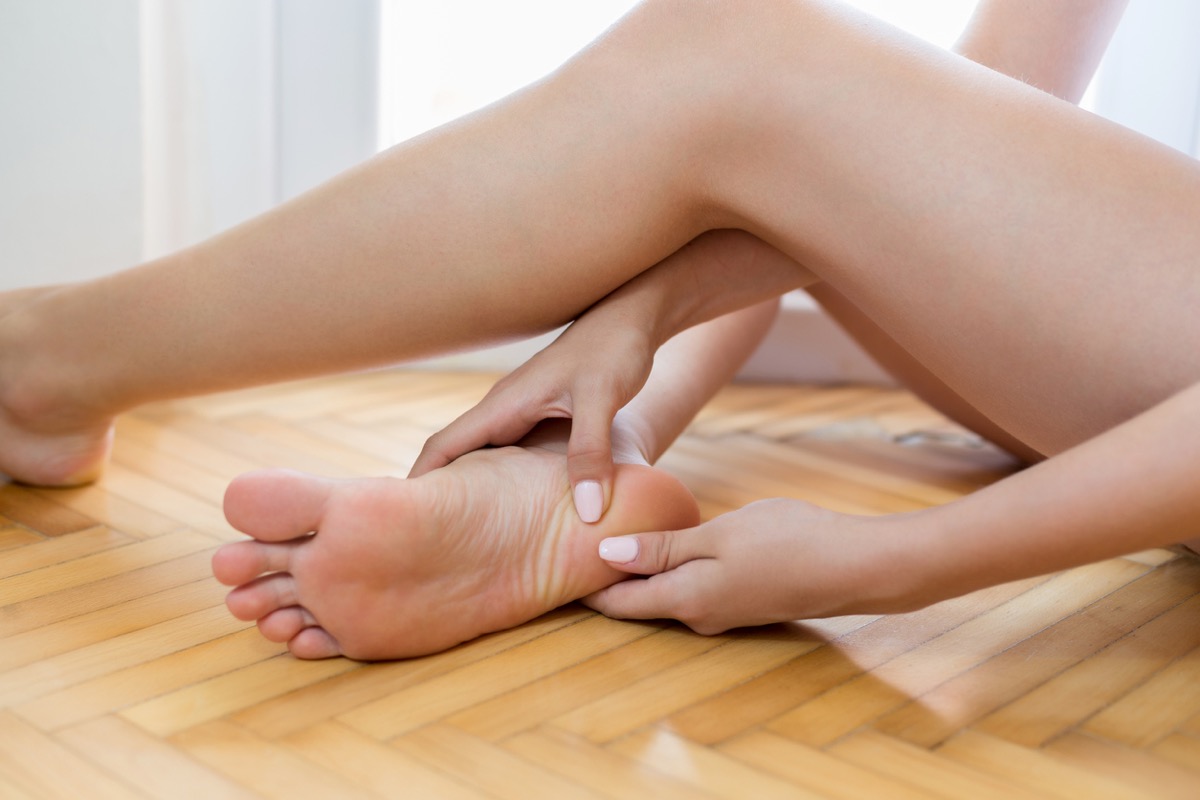
While hyperthyroidism and hypothyroidism have opposite meanings, both of these thyroid conditions can cause thickening and drying of the skin, which is usually most noticeable as dry, cracked heels.
41
Your ankles are swollen = You could have high blood pressure
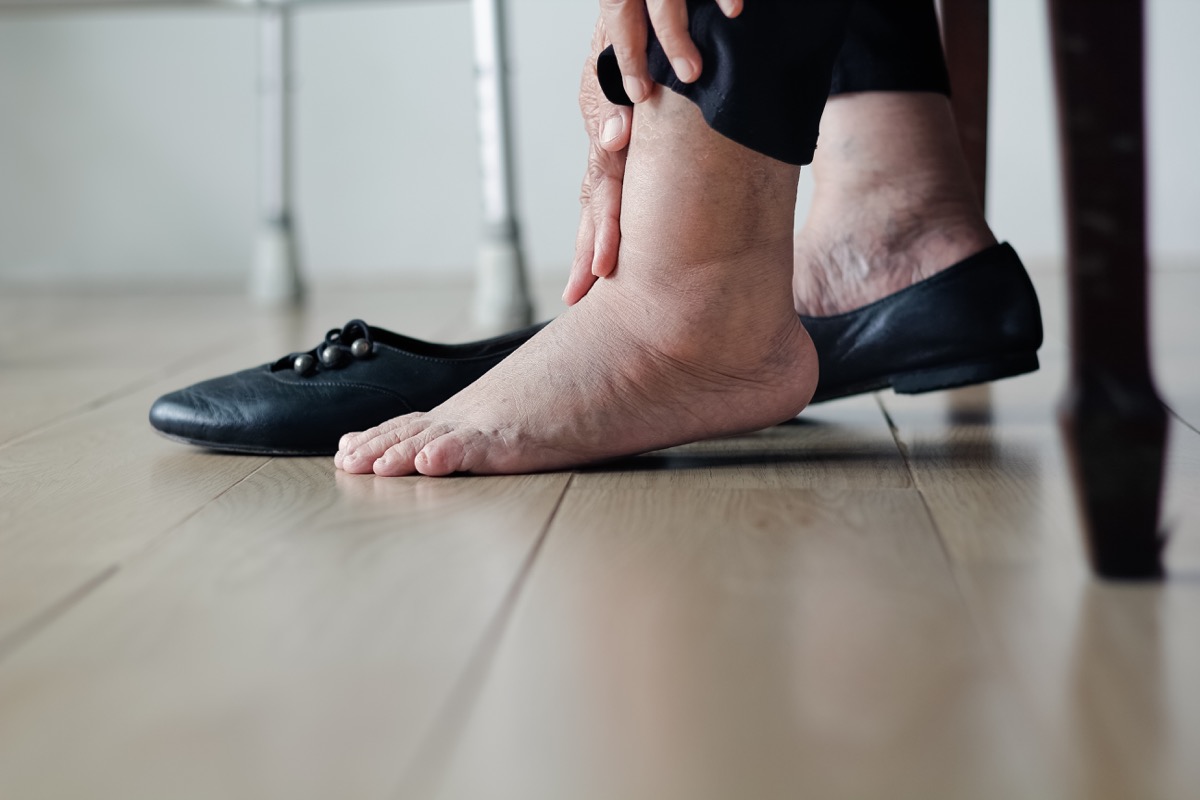
According to the U.K.'s Blood Pressure Association, high blood pressure makes the heart work harder, which eventually makes it less efficient at circulating blood throughout your body. This can cause fluid to build up in your ankles or lower legs, making them swell. Most of the time, this is merely an inconvenience, but over time, it can start to damage the skin and blood vessels in your ankles.
42
Your stool is black = You could have a stomach ulcer
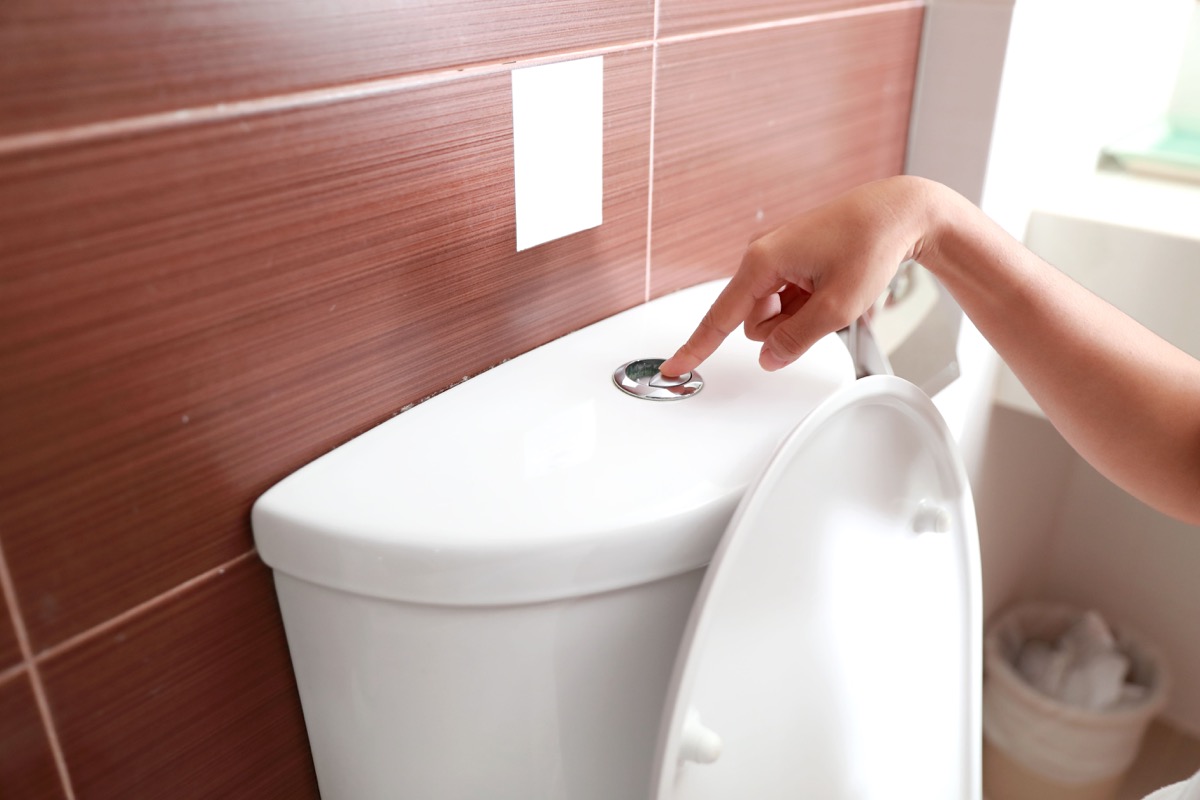
All kinds of digestive maladies lead to unusual bowel movements, so if your stool changes color or consistency, pay attention. Black stools can be the product of eating dark-colored foods or taking iron supplements, but they can also mean that there's blood in your upper digestive tract. If your stool is black and you're having stomach pain or heartburn, you could have a bleeding ulcer.
43
You have sores on the inside of your mouth = You could be intolerant to gluten

Celiac disease, or the inability to digest the protein gluten, usually affects the digestive system, and the mouth is the beginning of the digestive system. According to a significant 2009 study published in the journal BMC Gastroenterology, recurrent mouth sores can sometimes be the only symptom of celiac disease. If regular treatments don't seem to take the sores away, a gluten-free diet can sometimes do the trick.
44
Everyday sounds seem unbearably loud = You could have Lyme disease

Hyperacusis is a hearing disorder that makes common sounds like running water or normal conversation seem painfully loud. It's a bit like having a hangover, but no alcohol is involved. Most of the time, previous exposure to loud sounds is to blame, but since Lyme disease attacks the nervous system, including facial nerves, it can cause this hypersensitive hearing. According to an important 2003 study published in the Journal of the Royal Society of Medicine, hyperacusis symptoms "increase in extent at times of tiredness, anxiety or stress."
45
You have chronic tingling in your arms and legs = You might have blockage in your arteries
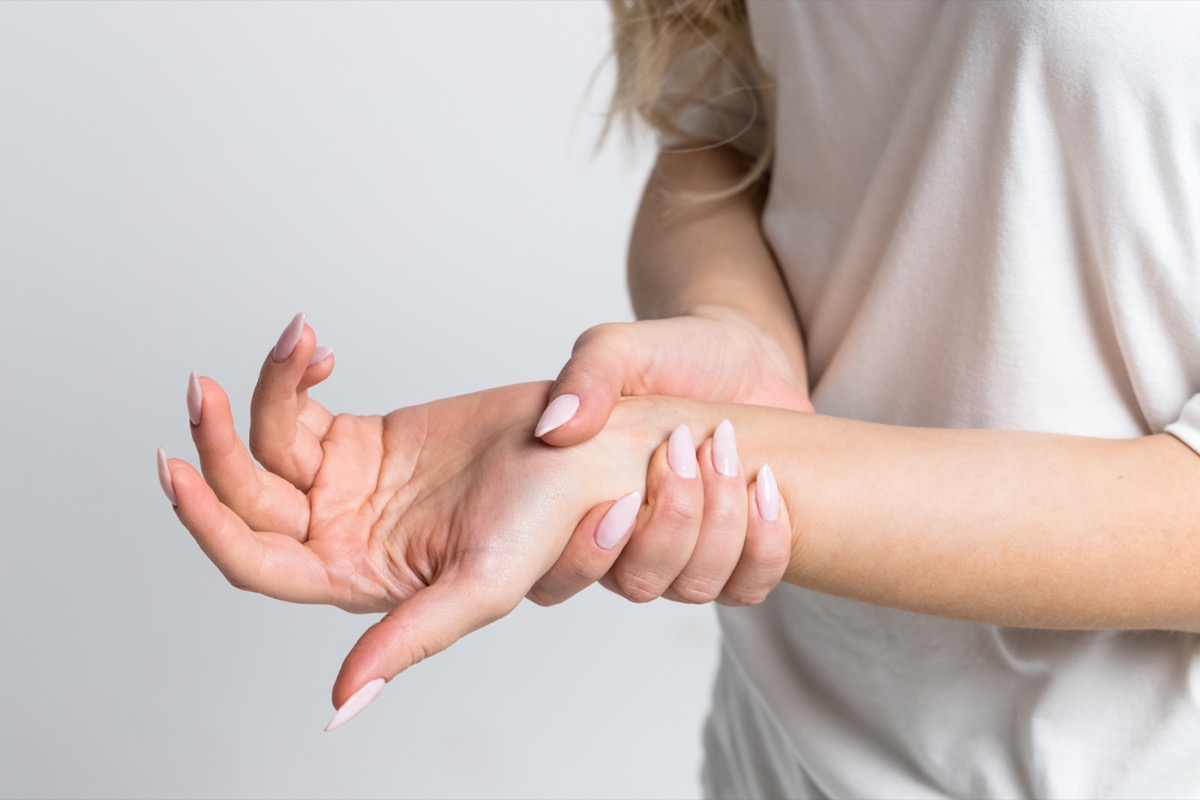
Atherosclerosis, or the buildup of plaque inside the body's blood vessels, affects nearly everyone to some extent by the time they're 65. However, if you're an older adult and you often feel tingling in your extremities, this may be a sign that your blood isn't able to flow properly because your arteries are becoming blocked. This is a common and serious problem, so the Mayo Clinic recommends consulting a doctor as soon as possible.
46
Your nails are brittle = You could have diabetes
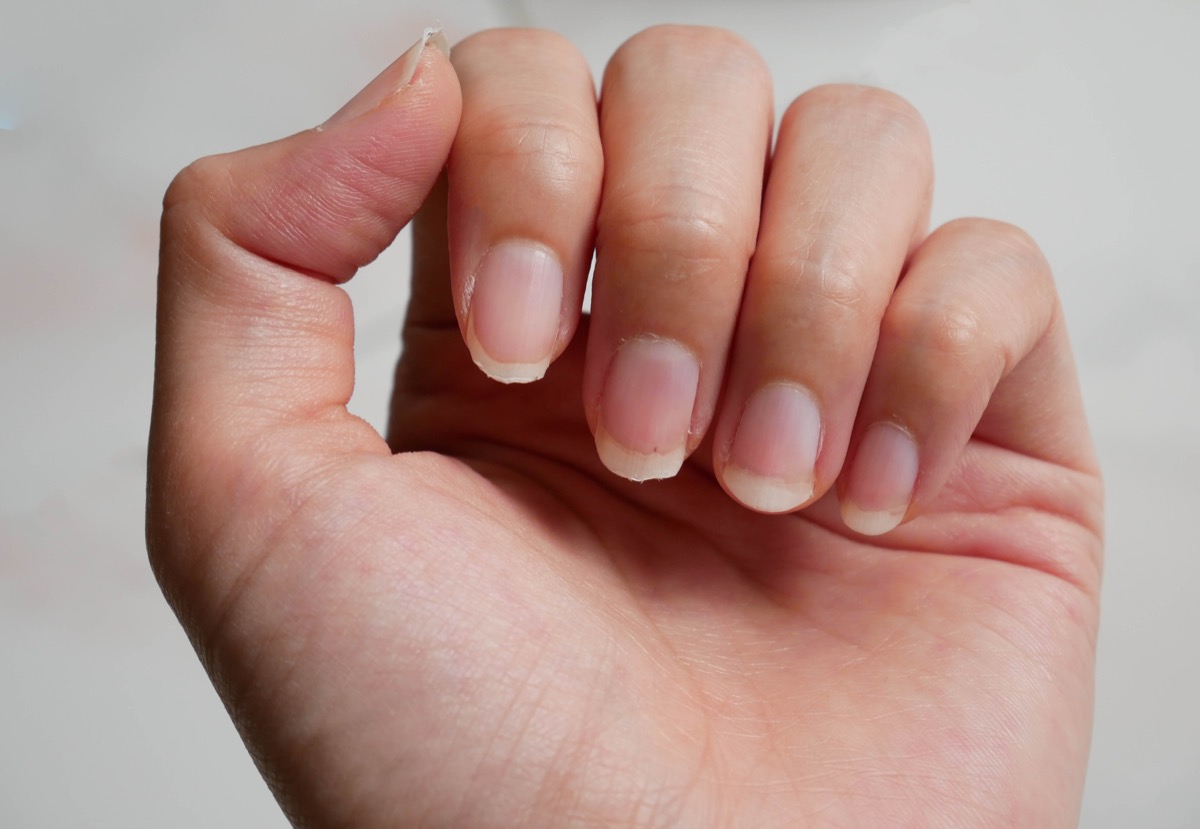
Although it's probably not the first or most obvious sign of diabetes, the blood flow problems that come with the disease can cause fingernails and toenails to become brittle and fragile. Nails can even break away from the nail bed, leaving room for infection and causing misshapen nails, as Rowan Hillson, MD, wrote for Practical Diabetes.
47
Your neck is too stiff to put your chin to your chest = You could have meningitis

The main symptom of meningitis, or an infection of the tissue around the brain and spinal cord, is a headache, but so many different conditions can cause headaches that you can't tell by that alone. However, a headache combined with flu-like symptoms and an inability to flex your neck forward, which occurs in about 70 percent of people with meningitis, could be a sign of this very serious infection.
48
Your eyes are dry = You need more vitamin A

If you notice your eyes are perpetually dry, it might be that you're not getting enough of this fat-soluble vitamin that's often found in meat, fish, eggs, and dairy.
"Dry eyes, or the inability to produce tears, is one of the first signs of vitamin A deficiency," Lizzie Streit, MS, explained to Healthline.
She points out that in extreme cases—particularly in developing countries—a long-term lack of vitamin A can even result in complete blindness. Increasing vitamin A in one's diet can quickly reverse dry eyes though. One oft-cited 1995 study published in Investigative Ophthamology & Visual Science, found that high doses of vitamin A decreased dry eyes among infants and children by 63 percent.
49
You tend to drop things = You could have carpal tunnel

The median nerve connects your arm to your hand, and to do so, it has to pass through a small hole between the bones in your wrist called the carpal tunnel. If swelling of the tissues in this area pinch the median nerve, doctors call the condition carpal tunnel syndrome. This can cause tingling and numbness in your fingers (except for your pinky) and thumb, but it can also prevent the muscles around your thumb from working correctly, causing you to drop things you're trying to hold.
50
You have night sweats = You could have cancer

If you tend to wake up drenched in sweat, there's no reason to immediately assume you have cancer—plenty of other things can cause night sweats. However, some cancers like Hodgkin's and non-Hodgkin's lymphoma and mesothelioma do cause night sweats as an early symptom, according to Cancer Research UK.





















